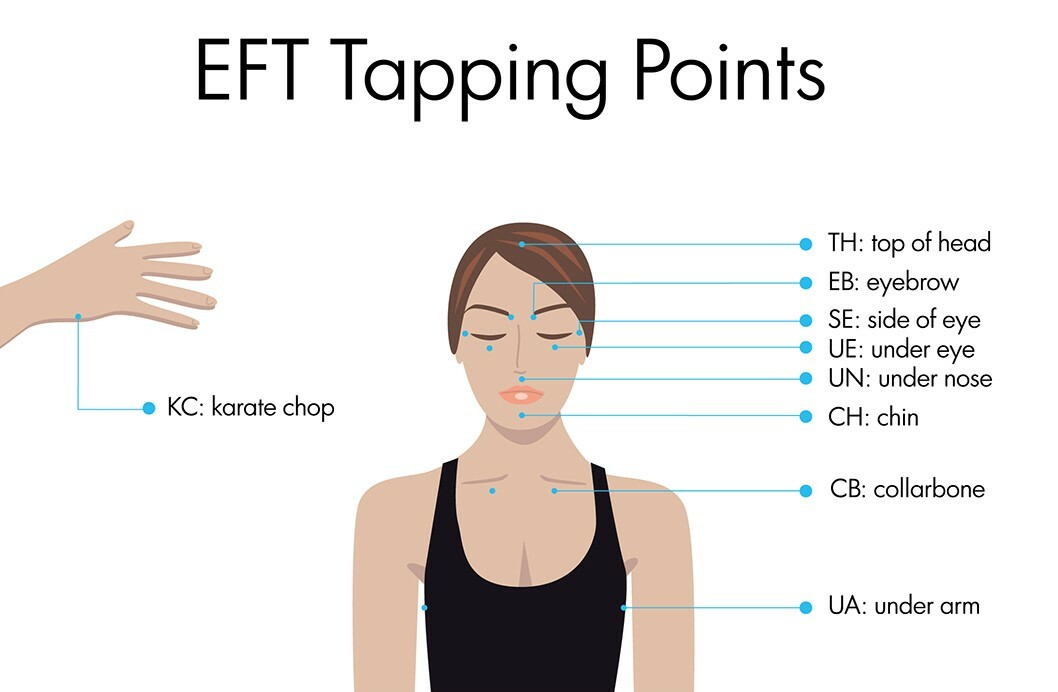Scam Victims’ Guide To Do-It-Yourself EFT Tapping
Helping Scam Victims Along the Path to Reducing Stress and Trauma
Authors:
• Vianey Gonzalez B.Sc(Psych) – Licensed Psychologist Specialty in Crime Victim Trauma Therapy, Neuropsychologist, Certified Deception Professional, Psychology Advisory Panel & Director of the Society of Citizens Against Relationship Scams Inc.
• Tim McGuinness, Ph.D. – Anthropologist, Scientist, Director of the Society of Citizens Against Relationship Scams Inc.
About This Article
EFT (Emotional Freedom Techniques) tapping offers scam victims a self-help tool for managing stress and trauma. Combining elements of Traditional Chinese Medicine and psychology, tapping involves stimulating specific acupressure points while focusing on emotional issues related to the scam experience.
By addressing disruptions in the body’s energy system, tapping aims to alleviate emotional distress and negative thought patterns. While SCARS shares this technique as a potential aid, it advises consulting with a therapist before starting.
EFT tapping involves identifying the issue, rating its intensity, creating setup statements, tapping on specific points, and reevaluating emotional distress levels. EFT tapping can empower scam victims by promoting emotional regulation, trauma processing, cognitive shifts, empowerment, and physical relief, but it’s not a substitute for professional therapy.
Employing Self-Help EFT Tapping Therapy for Scam Victims: A Potential Technique to Reducing Stress, Trauma Management and Recovery
What is EFT Tapping?
EFT Tapping (or Emotional Freedom Techniques Tapping,) is a form of alternative self-help therapy that combines elements of Traditional Chinese Medicine (TCM) and modern psychology. It involves tapping on specific acupressure points on the body while focusing on particular emotions or issues – which in this case will be your recovery from the scam.
The technique is based on the belief that disruptions in the body’s energy system can contribute to emotional distress and negative thought patterns. By tapping on these meridian points, practitioners aim to restore balance to the body’s energy system and alleviate emotional or psychological symptoms.
Please Note: SCARS is sharing this with you in the hope that you will find it of use. SCARS cannot guarantee that this will work for everyone, and as always we recommend that you review this with a therapist before starting any new activities.
EFT tapping typically involves the following steps:
- Identifying the Issue: Identify a specific emotional issue or problem that they want to address, such as acceptance of your situation, the anxiety it is causing, acknowledging that the scam was not your fault, the stress from this crime, any financial loss, or a past trauma.
- Rating the Intensity: Rate the intensity of their emotional distress before you begin on a scale from 0 to 10, with 0 being no distress and 10 being the highest level of distress.
- Setup Statement: While tapping on the karate chop point (the fleshy part of the hand below the little finger), the individual repeats a setup statement that acknowledges the issue and affirms self-acceptance. For example, “Even though I feel anxious about my scam, the betrayal, and my loss, I deeply and completely accept myself and that it was not my fault.”
- Tapping Sequence: Tap on specific acupressure points on the body, such as the top of the head, eyebrows, side of the eye, under the eye, under the nose, chin, collarbone, and under the arm, while repeating a reminder phrase that focuses on the issue. Such as, “I am a Survivor, It was NOT My Fault, I am not alone, AXIOS”
- Reevaluation: After completing several rounds of tapping, reevaluate the intensity of your emotional distress and compare it to the initial rating.
- Repeating as Needed: The individual continues tapping and repeating the process until the emotional distress has significantly diminished or disappeared.
EFT Tapping is often used to address a wide range of emotional issues, including anxiety, phobias, trauma, depression, and stress. While research on EFT tapping is still limited, some studies suggest that it may be effective in reducing psychological symptoms and promoting emotional well-being. However, more research is needed to understand its mechanisms and effectiveness fully.
Step By Step – Using EFT Tapping
The step-by-step guide on how to implement EFT tapping on yourself:
- Identify the Issue: Begin by identifying the specific emotional issue or problem you want to address. As a scam victim, this is going to be the scam, the betrayal, the relationship, the lost money, and anything else that you want to focus on.
- Rate the Intensity: Rate the intensity of your emotional distress on a scale from 0 to 10, with 0 being no distress and 10 being the highest level of distress. This will help you track your progress throughout the tapping session.
- Create a Setup Statement: While tapping on the karate chop point (the fleshy part of your hand below the little finger), create a setup statement that acknowledges the issue and affirms self-acceptance. For example, “Even though I feel anxious about [the issue], I deeply and completely accept myself.” We recommend that you use the SCARS Recovery Program affirmations: “I am a Survivor, It was NOT My Fault, I am not alone, AXIOS”
- Tapping Sequence: Tap on specific acupressure points on your body (see video below) while repeating a reminder phrase that focuses on the issue. Here are the tapping points:
- Top of the head (crown)
- Eyebrow (beginning of the eyebrow, near the bridge of the nose)
- Side of the eye (near the temple)
- Under the eye (below the pupil)
- Under the nose (above the upper lip)
- Chin (in the crease between the chin and the lower lip)
- Collarbone (where the collarbone meets the sternum)
- Under the arm (about four inches below the armpit)
- Tap and Repeat: Tap each point 5-7 times while repeating your reminder phrase. You can use phrases like “This anxiety,” “This stress,” or “This fear.” As you tap, focus on the issue and allow yourself to feel the associated emotions.
- Reevaluate: After completing a round of tapping, take a moment to reevaluate the intensity of your emotional distress. Compare it to your initial rating and notice any changes.
- Repeat as Needed: Continue tapping and repeating the process until the emotional distress has significantly diminished or disappeared. You can repeat the entire sequence multiple times if necessary.
- Final Assessment: Once you feel that your emotional distress has decreased to a manageable level, take a final assessment of your feelings. You may also want to revisit the issue in future tapping sessions if needed.
Remember, EFT tapping can be a highly personal experience, so feel free to modify the tapping points, phrases, or sequences to suit your individual needs. Additionally, it’s important to practice self-compassion and patience throughout the process, as emotional healing takes time and consistency.
After the EFT Tapping Exercise
After completing an EFT tapping session, there are several post-tapping exercises that can help increase or maintain the benefits:
- Deep Breathing: Engage in deep breathing exercises to promote relaxation and further reduce stress or anxiety. Take slow, deep breaths in through your nose, hold for a few seconds, and then exhale slowly through your mouth. Repeat this several times to calm your nervous system.
- Mindfulness or Meditation: Practice mindfulness or meditation techniques to cultivate present moment awareness and promote emotional balance. This can involve focusing on your breath, body sensations, or simply observing your thoughts without judgment.
- Positive Affirmations: Repeat positive affirmations related to the issue you addressed during the tapping session. Affirmations can help reinforce positive beliefs and shift negative thought patterns. For example, if you tapped on anxiety, repeat affirmations like “I am calm and at peace” or “I trust in my ability to handle challenges.”
- Journaling: Write in a journal to reflect on your tapping experience and any insights or emotions that arose during the session. Journaling can help deepen your understanding of yourself and the issues you’re facing, as well as track your progress over time.
- Physical Activity: Engage in physical activity such as walking, jogging, yoga, or tai chi to release tension from your body and further enhance relaxation. Exercise has been shown to reduce stress and improve mood, making it a beneficial complement to EFT tapping.
- Visualization: Use visualization techniques to imagine yourself feeling calm, confident, and empowered in situations that previously triggered stress or anxiety. Visualizing positive outcomes can help reprogram your subconscious mind and reinforce the benefits of tapping.
- Gratitude Practice: Cultivate a sense of gratitude by focusing on the things you’re thankful for in your life. Expressing gratitude can shift your perspective from negativity to positivity and enhance feelings of contentment and well-being.
- Self-Care Activities: Engage in self-care activities that nourish your mind, body, and spirit. This could include taking a warm bath, spending time in nature, listening to calming music, or indulging in a hobby you enjoy.
By incorporating these post-tapping exercises into your daily routine, you can prolong the benefits of EFT tapping and promote better overall emotional well-being. Experiment with different techniques to find what works best for you and make self-care a priority in your life.
Why Does EFT Tapping Work?
Emotional Freedom Techniques (EFT) tapping is a form of psychological acupressure that involves tapping on specific points on the body while focusing on a particular issue or emotion. While the exact mechanisms behind its effectiveness are not fully understood, there are several theories about how EFT tapping works in the body and brain:
- Stress Reduction: EFT tapping is believed to activate the body’s relaxation response, reducing levels of cortisol (the stress hormone) and promoting a sense of calm. By tapping on acupressure points, it may help release tension and decrease overall stress levels.
- Regulation of the Amygdala: The process of EFT tapping may help regulate activity in the amygdala, the part of the brain involved in processing emotions, particularly fear and anxiety. Research suggests that tapping on specific points may help deactivate the amygdala’s response to emotional triggers, leading to a reduction in emotional intensity.
- Stimulation of the Body’s Energy System: According to traditional Chinese medicine, tapping on specific meridian points helps to balance the body’s energy flow or chi. By tapping on these points, EFT may help remove blockages in the energy system, restoring balance and promoting emotional well-being.
- Cognitive Reframing: While tapping, individuals typically focus on the specific issue or emotion they want to address. This process may involve cognitive reframing, where they reevaluate their thoughts and beliefs about the issue, leading to a shift in perspective and emotional response.
- Distraction and Relaxation: The rhythmic tapping motions used in EFT may serve as a form of distraction, redirecting the individual’s attention away from negative thoughts or emotions. Additionally, the physical act of tapping can induce a state of relaxation, further reducing stress and anxiety.
Overall, EFT tapping appears to work through a combination of physiological and psychological mechanisms, helping to alleviate emotional distress and promote a sense of well-being. While more research is needed to fully understand its effects, many individuals report significant benefits from incorporating EFT tapping into their self-care routine.
The Research on EFT Tapping
The research on EFT (Emotional Freedom Techniques) tapping has been growing steadily over the past few decades, with studies examining its effectiveness for various psychological and physical conditions.
Please NOTE: SCARS presents this potential approach for your consideration only, Like with all potential therapeutical techniques we leave this for you to discuss with your counselor or therapist to decide if this is right for you.
Here’s an overview of the state of research on EFT tapping:
- Psychological Conditions: Numerous studies have investigated the use of EFT tapping for psychological conditions such as anxiety, depression, PTSD (Post-Traumatic Stress Disorder), phobias, and stress. While some studies have shown promising results in reducing symptoms and improving well-being, more high-quality research, including randomized controlled trials (RCTs), is needed to establish its efficacy definitively.
- Physical Conditions: Research also suggests that EFT tapping may have beneficial effects on certain physical conditions, including chronic pain, fibromyalgia, and headaches. Again, while preliminary findings are promising, further research is needed to fully understand its mechanisms of action and effectiveness for different health concerns.
- Brain Imaging Studies: Some studies have used neuroimaging techniques such as EEG (electroencephalography) and fMRI (functional magnetic resonance imaging) to investigate the neural mechanisms underlying EFT tapping. These studies have provided insights into how tapping affects brain activity and stress response systems, contributing to our understanding of its therapeutic effects.
- Meta-Analyses and Systematic Reviews: Several meta-analyses and systematic reviews have been conducted to synthesize the findings of multiple studies on EFT tapping. While some reviews have reported positive effects on psychological symptoms, others have highlighted methodological limitations and called for more rigorous research designs.
- Clinical Applications: EFT tapping is increasingly being used in clinical settings as a complementary therapy alongside conventional treatments. Some healthcare professionals incorporate tapping into their practice for conditions such as anxiety disorders, trauma, chronic pain, and addiction.
Overall, while there is growing evidence supporting the potential benefits of EFT tapping for various conditions, more high-quality research is needed to establish its efficacy, understand its mechanisms of action, and determine optimal protocols for different populations and contexts. Additionally, ongoing efforts to standardize training and certification for EFT practitioners can help ensure the quality and safety of its use in clinical practice.
You can learn more about the EFT Tapping technique at: EFT Tapping Method – EFT Tapping Therapy – Emotional Freedom Technique (eftuniverse.com)
Helping Scam Victims
EFT (Emotional Freedom Techniques) tapping may be beneficial for traumatized scam victims in several ways:
- Emotional Regulation: Scam victims often experience intense emotions such as fear, anger, shame, and betrayal. EFT tapping can help regulate these emotions by calming the body’s stress response system, reducing the intensity of negative feelings, and promoting a sense of calm and safety.
- Trauma Processing: EFT tapping can assist in processing and releasing traumatic memories and associated emotions. By tapping on specific acupressure points while focusing on the traumatic experience, individuals can gradually reduce the emotional charge attached to the memory, allowing for healing and resolution.
- Cognitive Shift: Scam victims may struggle with negative beliefs about themselves, such as feeling foolish or gullible. EFT tapping can help shift these beliefs by addressing underlying self-esteem issues and promoting self-compassion and acceptance.
- Empowerment: Engaging in EFT tapping empowers scam victims to take an active role in their healing process. By learning a simple and effective self-help technique, individuals regain a sense of control over their emotional well-being and can use tapping as a tool to manage future triggers or stressors.
- Physical Relief: Trauma often manifests not only as emotional distress but also as physical symptoms such as tension, headaches, or stomach problems. EFT tapping has been shown to alleviate physical symptoms by reducing stress levels and promoting relaxation in the body.
It’s important to note that while EFT tapping can be a helpful tool for trauma recovery, it is not a substitute for professional therapy or counseling. Scam victims experiencing severe or prolonged distress should seek support from a qualified mental health professional who can provide comprehensive assessment and treatment tailored to their individual needs.
EFT Tapping Introduction
One hour EFT session for releasing trauma and overwhelming emotion
More EFT Videos are available at: EFT Universe – YouTube
Please Rate This Article
Please Leave Us Your Comment
Also, tell us of any topics we might have missed.
Leave a Reply
Thank you for your comment. You may receive an email to follow up. We never share your data with marketers.
-/ 30 /-
What do you think about this?
Please share your thoughts in a comment above!
More Related Recovery Information:
- Scam Victims Guide To Do-It-Yourself Exposure Therapy – 2024 (scamsnow.com)
- Lego Therapy For Scam Victims (romancescamsnow.com)
- Curiosity & Scam Victim Recovery: A Powerful Tool for Processing Emotions After A Scam (romancescamsnow.com)
- Using Rituals To Help Scam Victims To Recover! (romancescamsnow.com)
- Clothes As Therapy For Scam Victims: When & How Does Enclothed Cognition Work? (romancescamsnow.com)
- Removing The Face Of Your Scammer From Your Mind (romancescamsnow.com)
- Write A Letter To Your Scammer – Say What You Feel [UPDATED] (romancescamsnow.com)
- Scam Victim Journaling And Recovery (romancescamsnow.com)
-/ 30 /-
What do you think about this?
Please share your thoughts in a comment above!
SCARS LINKS: AgainstScams.org RomanceScamsNOW.com ContraEstafas.org ScammerPhotos.com Anyscam.com ScamsNOW.com
reporting.AgainstScams.org support.AgainstScams.org membership.AgainstScams.org donate.AgainstScams.org shop.AgainstScams.org
youtube.AgainstScams.org linkedin.AgainstScams.org facebook.AgainstScams.org
ARTICLE RATING
TABLE OF CONTENTS
CATEGORIES
MOST POPULAR COMMENTED ARTICLES
POPULAR ARTICLES
U.S. & Canada Suicide Lifeline 988
![NavyLogo@4x-81[1]](https://scamsnow.com/wp-content/uploads/2025/04/NavyLogo@4x-811.png)
ARTICLE META
WHAT PEOPLE ARE TALKING ABOUT LATEST SITE COMMENTS
See Comments for this Article at the Bottom of the Page
on Aren’t We All The Same? Aren’t We All Just Meat-Robots? An essay on Humanity by Tim McGuinness, Ph.D. – 2025: “excelente!!! la claridad y la profundidad del análisis son realmente impresionantes. Me aportó mucho leerlo. totalmente de acuerdo entre la…” Jul 16, 11:17
on Savior Syndrome And The Negative Consequences To Them And Other Scam Victims – 2023: “We must heal ourselves before trying to help or heal others. It is easy to get caught up in the…” Jul 16, 11:13
on Anger & Self-Radicalization – Recovery Psychology 2023: “Anger can be useful but most often it is destructive on the individual, their family and friends. I like that…” Jul 16, 10:59
on Residual Fear In Scam Victims – 2024 [UPDATED 2025]: “Thank you for another fantastic SCARS article! I have felt some fear lately, that has caused me to feel tense…” Jul 16, 10:10
on Living in the Invisible Safety Bubble – 2025: “Enlightening, thought provoking, and another SCARS article that gives me pause. Recovery is a process and takes time. In a…” Jul 16, 07:46
on Living in the Invisible Safety Bubble – 2025: “We have too many kinds of scams in Japan. Recently, there are impersonation scam of “fake Cardinal account” gathering fraud…” Jul 16, 07:27
on Motte and Bailey – A Cognitive Pattern & Defense Mechanism that Inhibits Honest Acceptance – 2025: “Important information for reflection for any survivor : -to what extent the Motte & Bailey method is present / still…” Jul 16, 07:21
on Arts and Crafts Can Significantly Aid in Recovery for Scam Victims – 2025: “Right after the scam, I didn’t want to do anything. I felt defeated and ashamed—as if I had betrayed both…” Jul 16, 00:01
on The Fallacy of Fallacies & Living in the Real World – Error in Reasoning that Makes an Opinion Seem Valid – 2025: “I didn’t know about fallacies and cognitive biases until I enrolled in the Survivor’s School. When I learned about them,…” Jul 15, 23:40
on Motivational Denial – Recovery Psychology – 2023: “I agree with this article about some motivational material Looking at motivational material is not a totally bad thing but…” Jul 15, 12:25
on Living in the Invisible Safety Bubble – 2025: “I thought this was a brilliant article….lots to think about now.” Jul 15, 09:39
on Arts and Crafts Can Significantly Aid in Recovery for Scam Victims – 2025: “I did not realize that things I like doing very much—knitting or sudoku—were so helpful in my recovery process. The…” Jul 14, 11:28
on Projection And Scam Victims: “The moment I realized I had a financial loss due to a scam I realized that I felt shame, guilt,…” Jul 13, 19:12
on Japanese Legend of Tears – When There Are No Words – 2025: “After discovering the fraud, the pain was enormous. I shed oceans of tears, but I always tried to do it…” Jul 13, 10:50
on The SCARS Institute Scam Victim Recovery Timeline – 2025: “Wow. I umm experienced some of the later curves. I have been bouncing back and forth between asking myself why…” Jul 11, 00:01
on Transference And Emotional Danger After The Scam – 2024: “Thank you for the kind but firm reminder that the person in the stolen profile photo has their own life.…” Jul 9, 01:26
on ‘Mental Defeat’ – The Unique Condition Of Giving Up – 2024: “Thank you for another great article. I can see from this article that mental defeat would be debilitating to a…” Jul 9, 00:49
on Trust: Romance Scams Betrayal And Scam Victims – 2024: “This provided valuable insight that I can identify with” Jul 8, 16:44
on A Scam Victim in Extreme Distress – Stopping the Pain – 2024: “Your trust issues are very understandable. We are very sorry this happened to you. We suggest that you contact an…” Jul 8, 14:42
on A Scam Victim in Extreme Distress – Stopping the Pain – 2024: “My online counselors advised me to check myself in. I went to the hospital because I was suicidal. After I…” Jul 8, 13:44
Important Information for New Scam Victims
Please visit www.ScamVictimsSupport.org – a SCARS Website for New Scam Victims & Sextortion Victims
SCARS Institute now offers a free recovery program at www.SCARSeducation.org
Please visit www.ScamPsychology.org – to more fully understand the psychological concepts involved in scams and scam victim recovery
If you are looking for local trauma counselors, please visit counseling.AgainstScams.org
If you need to speak with someone now, you can dial 988 or find phone numbers for crisis hotlines all around the world here: www.opencounseling.com/suicide-hotlines
Statement About Victim Blaming
Some of our articles discuss various aspects of victims. This is both about better understanding victims (the science of victimology) and their behaviors and psychology. This helps us to educate victims/survivors about why these crimes happened and not to blame themselves, better develop recovery programs, and help victims avoid scams in the future. At times, this may sound like blaming the victim, but it does not blame scam victims; we are simply explaining the hows and whys of the experience victims have.
These articles, about the Psychology of Scams or Victim Psychology – meaning that all humans have psychological or cognitive characteristics in common that can either be exploited or work against us – help us all to understand the unique challenges victims face before, during, and after scams, fraud, or cybercrimes. These sometimes talk about some of the vulnerabilities the scammers exploit. Victims rarely have control of them or are even aware of them, until something like a scam happens, and then they can learn how their mind works and how to overcome these mechanisms.
Articles like these help victims and others understand these processes and how to help prevent them from being exploited again or to help them recover more easily by understanding their post-scam behaviors. Learn more about the Psychology of Scams at www.ScamPsychology.org
SCARS INSTITUTE RESOURCES:
If You Have Been Victimized By A Scam Or Cybercrime
♦ If you are a victim of scams, go to www.ScamVictimsSupport.org for real knowledge and help
♦ Enroll in SCARS Scam Survivor’s School now at www.SCARSeducation.org
♦ To report criminals, visit https://reporting.AgainstScams.org – we will NEVER give your data to money recovery companies like some do!
♦ Follow us and find our podcasts, webinars, and helpful videos on YouTube: https://www.youtube.com/@RomancescamsNowcom
♦ Learn about the Psychology of Scams at www.ScamPsychology.org
♦ Dig deeper into the reality of scams, fraud, and cybercrime at www.ScamsNOW.com and www.RomanceScamsNOW.com
♦ Scam Survivor’s Stories: www.ScamSurvivorStories.org
♦ For Scam Victim Advocates visit www.ScamVictimsAdvocates.org
♦ See more scammer photos on www.ScammerPhotos.com
You can also find the SCARS Institute on Facebook, Instagram, X, LinkedIn, and TruthSocial
Psychology Disclaimer:
All articles about psychology and the human brain on this website are for information & education only
The information provided in this and other SCARS articles are intended for educational and self-help purposes only and should not be construed as a substitute for professional therapy or counseling.
Note about Mindfulness: Mindfulness practices have the potential to create psychological distress for some individuals. Please consult a mental health professional or experienced meditation instructor for guidance should you encounter difficulties.
While any self-help techniques outlined herein may be beneficial for scam victims seeking to recover from their experience and move towards recovery, it is important to consult with a qualified mental health professional before initiating any course of action. Each individual’s experience and needs are unique, and what works for one person may not be suitable for another.
Additionally, any approach may not be appropriate for individuals with certain pre-existing mental health conditions or trauma histories. It is advisable to seek guidance from a licensed therapist or counselor who can provide personalized support, guidance, and treatment tailored to your specific needs.
If you are experiencing significant distress or emotional difficulties related to a scam or other traumatic event, please consult your doctor or mental health provider for appropriate care and support.
Also read our SCARS Institute Statement about Professional Care for Scam Victims – click here
If you are in crisis, feeling desperate, or in despair, please call 988 or your local crisis hotline.
More ScamsNOW.com Articles
A Question of Trust
At the SCARS Institute, we invite you to do your own research on the topics we speak about and publish. Our team investigates the subject being discussed, especially when it comes to understanding the scam victims-survivors’ experience. You can do Google searches, but in many cases, you will have to wade through scientific papers and studies. However, remember that biases and perspectives matter and influence the outcome. Regardless, we encourage you to explore these topics as thoroughly as you can for your own awareness.
















![scars-institute[1]](https://scamsnow.com/wp-content/uploads/2025/04/scars-institute1.png)
![niprc1.png1_-150×1501-1[1]](https://scamsnow.com/wp-content/uploads/2025/04/niprc1.png1_-150x1501-11.webp)

I have tried tapping in the past and was not successful with it. That said I realize we are not all alike, what works for one may have a different result for another. I am glad that this method is showing promise and I look forward to seeing results from further study.
In the early weeks of discovering I was scammed, I was taught EFT tapping by my therapist. I did it several times a week and it was really effective for me. It helped me to do in between my sessions with my therapist, especially during difficult moments.